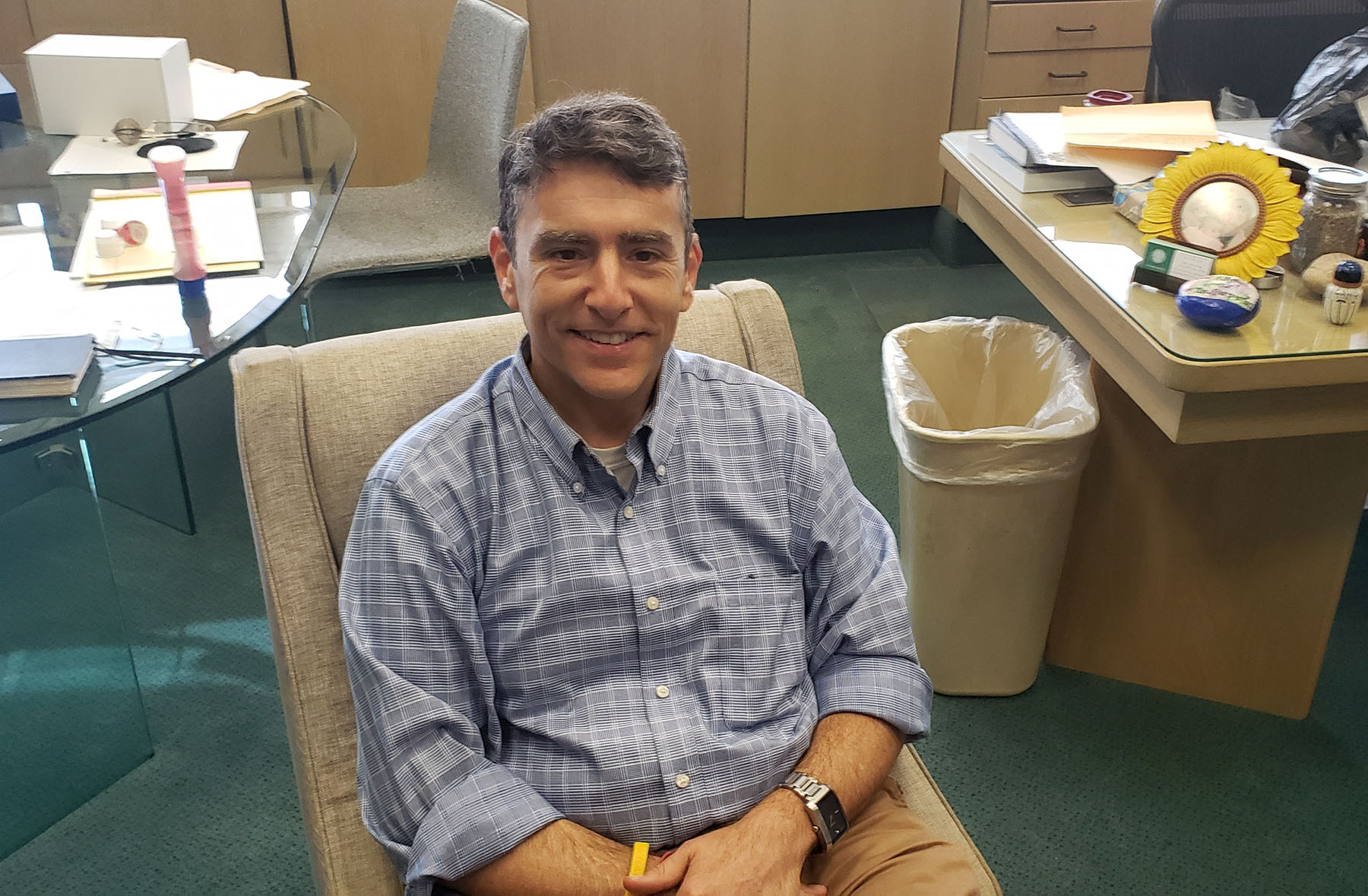 Rabbi Adam Kligfeld (Photo by Ari L. Noonan)
Rabbi Adam Kligfeld (Photo by Ari L. Noonan) How do you know the correct way to respond to something happening for the first time in your life?
As religious leader of one of the larger synagogues in Los Angeles, Rabbi Adam Kligfeld of Temple Beth Am, also the father of three school-age children, confronted myriad conflicts at the onset of the pandemic.
“First reactions happened in slow-motion,” he said. “We were all in a state of denial. We were pulled by political forces that changed what a fact is and whom to believe.”
“There were histrionics and extremes from those who preached caution and also from skeptics.”
So Kligfeld did what he has done for nine years at Beth Am and throughout much of his life: “I was trying to figure out a sane place in the middle.”
If the Conservative synagogue’s 900 families were looking to him for direction, they needed to be patient, at least in the beginning.
Kligfeld consulted epidemiologists “who were in diametrically opposed places about what to do. ‘This is a pandemic,’ they told me. ‘Not much we can to do stop it. There is going to be enormous loss of life.’ They were not necessarily in agreement that a draconian lockdown was the best, or only, way to go. Others said, ‘Stop everything now. Keep people away from one another. Don’t let any member of your community within six feet of one another.’
“These were the experts I was turning to,” said Kligfeld.
“My first concern was maintaining the health, the lives, the well-being of my community. To protect lives, we had to break down the community from its norms. It was really challenging.”
“As with all communities,” he added, “the people of our community love to be with each other. On Shabbat morning, this building has 400 to 500 people coursing through it. Various programs, davening, cholent, children frolicking, the way a Shabbat morning should be.”
With COVID-19 closing all synagogues, Zoom replaced in-person contact—kind of. Rabbi Kligfeld spent much of his days on Zoom. “Ultimately,” he said, “I think we had a successful funneling of Shabbat morning through our digital portal.”
Still, he said, “it is not at all clear how long you can continue operating only digitally and still call yourself a community… At the same time, we wanted to expand our community. We wanted to include people who were either homebound and local, or not local but had heard about the Torah we were teaching and wanted to join us.”
Kligfeld concluded that emergency adjustments “broke down some of the basic building blocks of communal life, but it also allowed us to recreate communal life in new ways.”
“I sometimes think about how awful and wonderful it is that we can get used to things we didn’t think we could get used to,” the rabbi said. “I have watched people confront unspeakable grief. You don’t want to, but you can. You can walk through the valley of the shadow of death. It is amazing and awful. It means you can live without your beloved, without your parents or, G-d forbid, without your child.
“On a smaller scale, it is both amazing and awful how we adjusted, amazing because we showed ourselves to be flexible and inventive. We just got used to a different body posture for work and for prayer. It is awful because you don’t want to think of yourself as being able to adjust to the absence of something so precious in your life.
“ON A SMALLER SCALE, IT IS BOTH AMAZING AND AWFUL HOW WE ADJUSTED, AMAZING BECAUSE WE SHOWED OURSELVES TO BE FLEXIBLE AND INVENTIVE.”
“It was like the Exile. You are still longing for Yerushalayim.”
How would he grade his performance? “You have to be a little pompous to give yourself an A,” he said. “But I will say I am very proud of us, my team. Give them credit (I take none for myself) in terms of how they switched on a dime. They created something out of nothing. No one was looking at a job description, saying ‘This is not what I was hired to do.’
“‘My team’ means the clergy (Rabbi Rebecca Schatz, Rabbi-Cantor Hillary Chorny, Rabbi Matt Shapiro), Executive Director Sheryl Goldman and our unbelievable Head of School Dr. Erica Rothblum and lay people. Stuart Tochner, our synagogue president, took over in the middle of this, last July 1, with many plans and hopes. He has led us with tremendous smarts and staying power.”
“I think I, my family and this community are emerging mostly intact and whole. But it was an undulating curve.”
Speaking of family and the three Kligfeld children, the rabbi says his 19-year-old is “healthy and raring to go,” his 17-year-old “rues the fact she will be forced to go back to campus,” and his nine-year-old “probably will remember this the least.”
Meanwhile, presently at Beth Am, indoor services are limited to vaccinated adults, no distancing or masks required. Outdoor services are open to all.
Is he eager to return to normal, everyone welcome everywhere? “As my friends like to say, ‘Does a cat have a tucchus?’ With great zeal.”























 More news and opinions than at a Shabbat dinner, right in your inbox.
More news and opinions than at a Shabbat dinner, right in your inbox.